#person ( richard harmon. )
Text
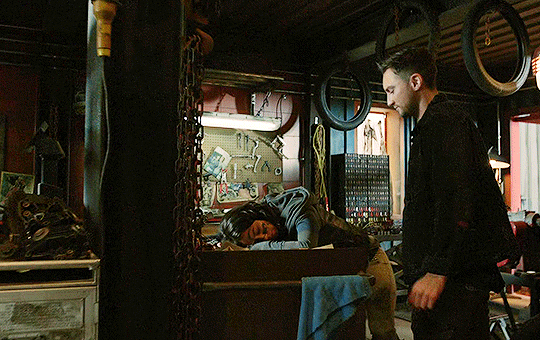

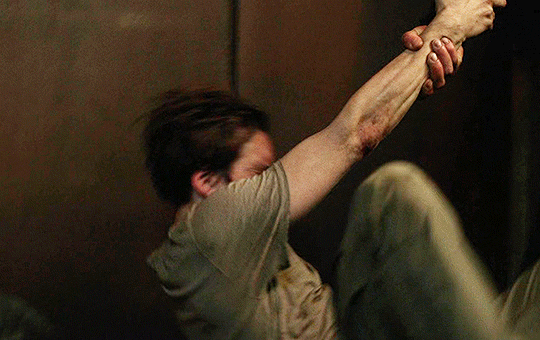


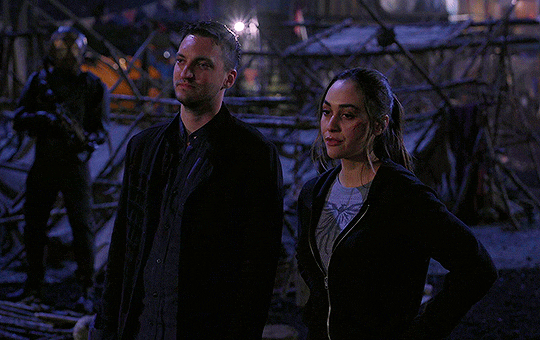
characters in the spotlight
» john murphy : connections
#The 100#John Murphy#Richard Harmon#the100edit#all of Murphy's most important relationships#Emori: the person who showed him what true love is and where he found his home#Jaha: the essential catalyst for his entire character arc#Bellamy: once his most bitter adversary now turned brother#Indra: the first positive parental figure he's had in his life since his father died#Clarke: started off as enemies but now he's the fun uncle to her daughter#Raven: the first person to truly forgive him leading to them creating a strong friendship
110 notes
·
View notes
Text
The 100 knew how to do a redemption arc.
Throughout its seven-season run on The CW, post-apocalyptic sci-fi drama repeatedly doubled down on one of its many thought-provoking mantras: there are no good guys. The “good guys” often did terrible things in the name of survival, and the “bad guys” were rarely through-and-through evil (although they could be “cockroaches”).
Timed to the recent 10-year anniversary of the series premiere, we chatted with Richard Harmon, Lindsey Morgan, and Henry Ian Cusick about how they came to join the show, the extent to which Harmon and Cusick saw their characters as villains during the first season, and why they think The 100 has stuck around in the sci-fi genre.
Murphy wasn’t originally Murphy: he was “John #1,” and he wasn’t meant to live past the show’s second episode. Harmon recalled the process of first auditioning for the show: “I originally auditioned for the role of Bellamy, beautifully played by Bob Morley,” he said. “I remember auditioning for that and thinking, ‘There’s no way in hell I’m ever going to get this role.’ Lo and behold, I did not.” Weeks later, he got an audition for the roles of “John #1” and “John #2,” and after feeling confident that he’d booked it, he learned that he had. He was John #1.
Harmon said that despite his character’s predetermined Episode 2 death, he approached the first episode determined to do something different and have fun with the role. Thankfully, showrunner Jason Rothenberg was watching. “I guess he noticed that, liked what I was doing, and expanded the role in some rewrites during the shooting of the Pilot,” Harmon said, adding that half of what Murphy said in the aired Pilot wasn’t there in the original script. “When it got picked up to series, he emailed me personally—which was kind of a shocking thing as not a lead, to get an email from the creator of the show. He said, ‘I really liked what you did, how would you feel about not dying in the second episode? Could you stick around for the whole first season? Your last name will be Murphy, people will call you Murphy, and what do you think?’” And so went the story of how he booked “John #1”… and how “John #1” became John Murphy.
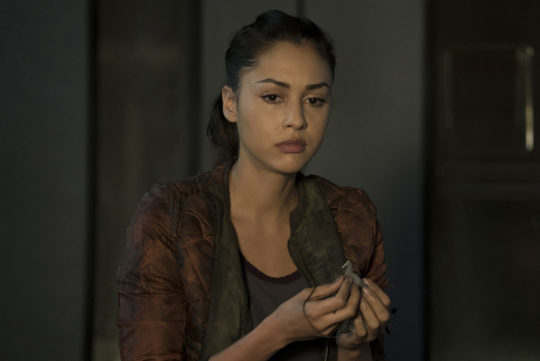
Katie Yu/The CW
First appearing in the show’s second episode rather than in the Pilot, Morgan wound up on The 100 through a whirlwind of correct timing and fate. She’d been waiting to hear whether she’d booked a role on Chicago P.D. when she auditioned for the part of Raven on Tuesday, chemistry-read with Thomas McDonnell [played Finn Collins] on Thursday, and was on a plane headed to Vancouver by Sunday. She later found out she wouldn’t have gotten the Chicago P.D. role. “It’s crazy to look back and imagine it happening any other way,” she said.
Similarly to Harmon’s “John #1,” Morgan’s Raven wasn’t meant to be a The 100 mainstay. Originally, Morgan said, Raven was meant to die after just five episodes—a shock, when one considers how integral the quick-thinking mechanic and tech genius became to the plot of the show. “I was on pins and needles, waiting to receive my death notice with each passing script,” Morgan said. After the Season 1 finale, Rothenberg made the offer to Morgan to stick around for Season 2. She’d been up for a role on a different show at that time. If she’d gotten it, Raven would’ve died from the gunshot wound dealt her by Murphy. Obviously, Raven survived. “The rest was history,” Morgan said. “As we all know, nothing can kill Raven Reyes.”
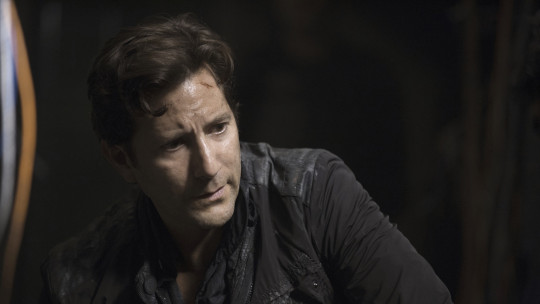
The CW
For his part, Cusick mentioned that it was a sense of longing for Lost that led him to The 100. “It was Pilot season, and I had just finished something, and I was reading a bunch of Pilots,” he remembered. “The 100 turned up, and I thought it was very similar in tone to Lost, which I was missing. I read that and I said to my agent, ‘That’s a cool Pilot.’ I ended up having a meeting with [showrunner] Jason Rothenberg, and we had a chat, and he offered it to me.”
While he did almost float Clarke’s mother, Dr. Abby Griffin (Paige Turco}, in the Pilot, Cusick disagrees with the label of Kane as a villain and passionately defends him. Even in the show’s early days, he says he just viewed Kane as “more of a d**k.” Cusick recounts several things his character was accused of doing but never actually did—such as attempting to kill Jaha (Isaiah Washington)—and maintains that rather than being villainous, Kane was simply a stickler for the rules. “Other people were talking about him and badmouthing him, but he was just a man who was trying to save the human race,” Cusick said. “He went about it in a rather authoritarian, draconian way. He was very strict. And then when he arrived on Earth, he went ‘Oh, humanity is still around.’ Then he could go back to being who he really was. That’s my opinion.”
Whether viewers considered him a villain or a d**k, Kane undoubtedly softened up. His kindness and diplomacy helped establish peace with the grounders as he formed a friendship with Indra (Adina Porter), he and Abby fell in love, and he gradually became a father figure to the delinquents—especially Bellamy Blake (Bob Morley). “I really took to Bob quite quickly,” Cusick remembered. “We would joke around a lot. I would call him my ‘idiot son’ and stuff like that,” he said with a laugh. “We kind of cultivated that relationship, I thought, that we were like father and son. We enjoyed each other’s company, so that was easy to play.”

The CW
Harmon, on the other hand, readily admitted he played Murphy as a villain in Season 1—so much so that he’d taken inspiration for Murphy and Bellamy’s relationship from Biblical literature. “I based [Murphy] loosely off of Lucifer, actually,” he said. “Bellamy was God, for this group, and I’m his right-hand favorite angel, but demon, really. Eventually I try to take too much power, just like Lucifer does in the Bible, and God smites me down. That’s when I get thrown out to the grounders in the wild and come back way later, with the sickness.”
When the show was picked up for a second season, Harmon and Rothenberg had another chat. “At the end of Season 1, Jason said, ‘Will you stick around for the long haul now going forward to Season 2?’” Harmon said. “And I was like, ‘Of course, I would love to, but how are you going to do that?’” Rothenberg, Harmon remembered, wanted him to get the audience on Murphy’s side. Harmon was up for the challenge, as long as he was given material to convince the audience that there was a good reason behind Murphy’s notable not-niceness. “Eventually, as the seasons progressed and the fans responded favorably to Murphy, all of my cuts were a good angle, and I was a little more tanned with dirt, and I was like, ‘I think they’re trying to, maybe, make me hot,” Harmon laughed. “I don’t think at that point in my career anyone had ever tried to make me attractive on-screen before. That was nice. That felt good.”
Raven Reyes was about as far from a villain as one could get, even though she, like every character, had to make incredibly difficult choices. Morgan has fond memories especially of Season 2, and portraying Raven’s journey with losing the use of her leg. “As an able-bodied actor, I felt a deep responsibility and honor towards playing a character with disabilities as accurately as I could,” she said. “I wanted to bring justice, nuance, complexity, and the best accuracy to her journey as I could, and hopefully share and showcase her truth, as well as the strength people with disabilities exhibit daily.”
Morgan, too, has fond memories of filming in the Vancouver wilderness. While filming with Cusick and the “adult” cast on the Ark put her inside in the warm studio (and closer to the snacks), she enjoyed being outside in the forest… and sneaking in an on-set nap when an opportunity presented itself. “I can, and will, nap anywhere,” she recalled. “Thomas [McDonnell] almost stepped on my head once, because I was napping on the floor of our cast tent. I blended into the ground.”
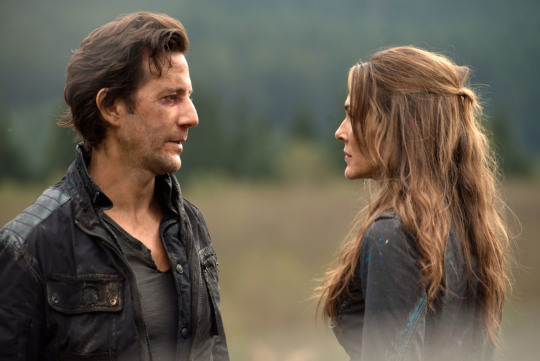
The CW
Aside from his bond with Bellamy Blake, Kane’s other major connection on The 100 was his romance with Dr. Abby Griffin. Surprisingly, Cusick hadn’t known the writers intended to take the characters in that direction. “I remember Paige [Turco] saying to me, ‘I think they’re trying to get us together,’ and I was thinking, ‘No, that’s never going to happen. We need to be combative. That’s where the drama is,’” he said. In the end, Kane and Abby had a heartwarming love that lasted several seasons. Cusick thinks that not being told from the start about the romance angle only improved his performance. “The actors had no clue that was going to happen, so we were just playing our motivations, and our roles, and what we thought was right,” he said. “There was no hint of any flirtation or anything like that between the characters, so that’s when it happened. Maybe the audience saw it, I don’t know, but it was certainly a surprise to me.”
Unfortunately, Kane and Abby didn’t have the happy ending that many might’ve hoped for. Cusick departed the show in its sixth season, and Turco’s character was killed off in the Season 6 finale. While The 100 fans know all about heartbreak, it might add an extra layer of sadness to know that originally, Kane and Abby had been intended to have a more hopeful story. “My relationship with Abby was good, and people wanted us to get together,” Cusick reflected. “I think that would’ve happened, had I not left. I know that Jason [Rothenberg] said he wanted that to happen—he wanted us to get married, which would’ve been interesting.”
Cusick also directed the eleventh episode of Season 4, “The Other Side,” and the tenth episode of Season 5, “The Warriors Will.” When he thinks back on those experiences, he does so with appreciation for the show’s crew including director of photography Michael Blundell, and gratitude to Jason Rothenberg, director Dean White, and the cast. “Just in general, I never really got a chance to say this: I wanted to say thank you,” he said. “When I meet everyone at cons, I’m thinking about how we all went through this together. We all have relationships that are unique, because we went through that show. I’m always amazed when we meet up at cons by how fun they all are, and how nice it is to see them again.”

The CW
On the subject of conventions, Harmon mentioned that he and Morley used to take it as a badge of honor when fans would tell them that they hated Murphy and Bellamy. Twitter death threats, too, Harmon learned to take in stride. “It got a little hectic at times, for sure,” he remembered. “If people wanted to hate you so much, I’m so grateful for that. That just means we did our job well.” Harmon also mentioned that he wished he’d gotten to keep Murphy’s jacket from Season 1. Unfortunately, he doesn’t know what happened to it. Morgan, on the other hand, has held onto a few of Raven’s iconic items—including her trademark red jacket and knee brace. “I joked that I was going to make a plaster cast out of my body and display them in my house,” she said. “I definitely didn’t do that, but I have them in a safe place.”
As for The 100’s staying power, Harmon, Morgan, and Cusick all pointed out its continued interrogation of what it means to be human, especially in heightened, life-or-death situations. While the show was airing, Harmon said he called it the “biggest show you’ve never heard of.” At this point, he no longer thinks that description is true—people have heard of it.
“It was cool to be on the biggest show you’ve never heard of, because people would be like, ‘What show?’ and then all of a sudden there’d be five people who’d go, ‘The 100? Yes!’” he remembered. “People who watched it fell in love with it. Or were livid with it. Either way.”
31 notes
·
View notes
Text
Healthy/Unhealthy Type 5
Healthy Social 5

Milo Thatch (5w4 so/sp)- he rejects allot of the traditional notion about the E5 we usually see. He is open about his feelings and is extremely extroverted, always eager to share his knowledge . He is always able to express how he feels and live in the moment.
Barbara Gordon (5w6 so/sx)- Even at her lowest Barb is always capable of thinking of solutions. She's always there for the team and always open to helping others.
Dale Cooper (5w4 so/sx)- The most charismatic E5 in media. He was always up to learn about things and kept a very clear mind on what was going on in the moment. Always seemed to care about getting his facts right and was open to understanding others.
Unhealthy Social 5
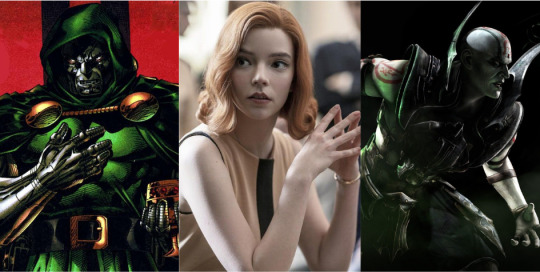
Doctor Doom (5w4 so/sx)- I was very close to typing him as an SO3 but honestly after paying a bit more attention it's very clear he is an SO5. Dooms whole idea revolves around outsmarting Reed Richards and proving he is his superior drives him into obsession and isolation.
Beth Harmon (5w6 so/sp)- Her desire to be the best at chest drives her to obsession and as the series goes on we see her disintegrate towards 8 and eventually moving back to her normal self. In the end we see a Beth who has let go of her need of perfection in chest and just finds enjoyment in the sport.
Quan Chi (5w6 so/sp)- His desire for knowledge intertwines with his need for power and control. Eventually deciding to create and army of the undead and resurrect multiple people who have been long gone.
Healthy Self-preservation 5
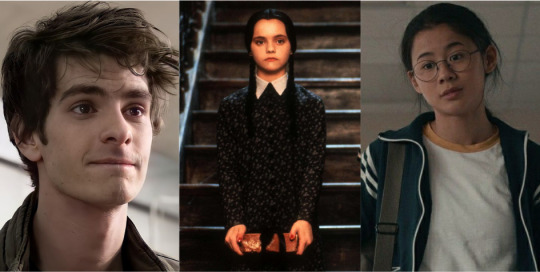
Peter Parker TASM (5w6 sp/sx)- This version of Peter Parker is more focused on the look for knowledge and understanding. He is a bit less focused on the external world but rather his own personal understanding of his family. However he never rejected others and always stayed
Wednesday Adams (5w4 sp/so)- While she can be looked at as detached from others. In the second movie we see a Wednesday who clearly has her heart in the right place. She is caring and always looking for the vest for her family.
Ellie Chu (5w6 sp/so)- At the beginning of the film we see her reduce her self as much as possible trying to go by unnoticed. but as the movie goes on we see her become more open about her feelings and stop being afraid of creating connections with others.
Unhealthy Self-preservation 5

Donnie Darko (5w4 sp/so)-In the movie we see him spiral completely down and detach himself from others.
Walter White (5w6 sp/so)- Wanting to feel alive in the little time he has he decides to over indulge and let him self go. He disintegrates towards 8 a bit each season. In the end eventually loosing everyone.
Haymitch Avarnethay (5w6 sp/so)- Due to the effects the games had on him we see him make a slow move to 8. While he is Katniss mentor we see him improve himself and become more centered in reality.
Healthy Sexual 5

Simon Petrigrof (5w6 sx/sp)- In the beginning of F&C we meet back with him completely sad and focused on getting Betty back. He has comply withdrawn from others and grew to believe he didn't have ay value outside of getting with Betty. In the end of the show we see him make peace with Betty and moving on.
James (EOFW) (5w4 sx/sp)- He spent allot of time detached from others and due to this he believed he has APD. However when Alissa finds him they become close and form a bond that couldn't be broken. While their Journey has consequences they were able to come together to figure out in the end.
Alan Wake (5w4 sx/so)- While allot of his actions are morally dubious, his desire was always to share the stories he had to tell. And his love for Alice kept him sane in the dark place.
Unhealthy Sexual 5
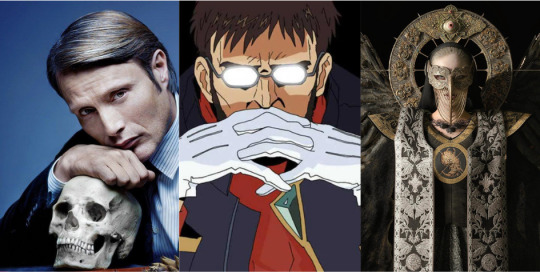
Hannibal Lecter (5w4 sx/so)- His intense desire to have a relationship with Will Graham sends him spiraling down to the point of obsession.
Gendo Ikari (5w4 sx/so)- He completely withdraws from the world once he loses Yui and neglects Shinji in the process. He eventually tries to make the third impact happen in order to get over the core fear of enneagram 5.
Mother Miranda (5w6 sx/so)- She intended to substitute someone else's baby for her own...Yeah pretty self explanatory. Her desire to have that special bond with Eva takes her to dark places. Eventually neglecting her "children" this eventually causing all of them desiring her personal admiration and validation (dying for it too).
#mbti#zodiac#personality types#16 personalities#zodic signs#ennegram#mbti personality types#enneagram#typology#personality typology#type 5#enneagram 5#5w4#5w6#beth harmon#gendo ikari#hannibal nbc#hannibal lecter#walter white#breaking bad#dale cooper#fire walk with me#twin peaks#simon petrigrof#alan wake 2#andrew garfield#spider man#wednsday addams#fiona and cake#milo thatch
23 notes
·
View notes
Note
for the ask meme, top 5 photos of keith and charlie! 🥹
also! while you’re at it, top 5 keith songs (can be both the stones or his solo works)
This isn’t intentional, but every photo I ended up picking of them is from the last 30 or so years of the band.
In no particular order:
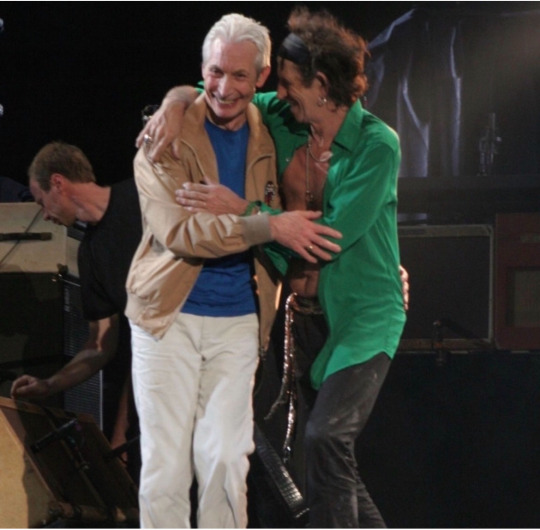
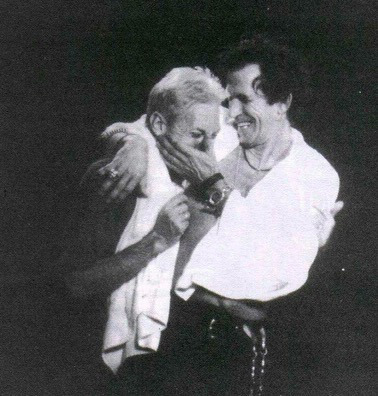
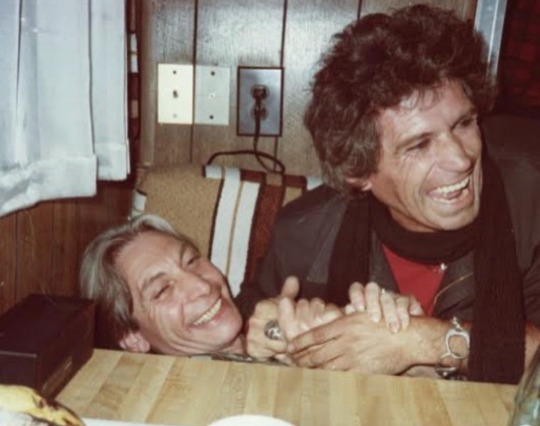
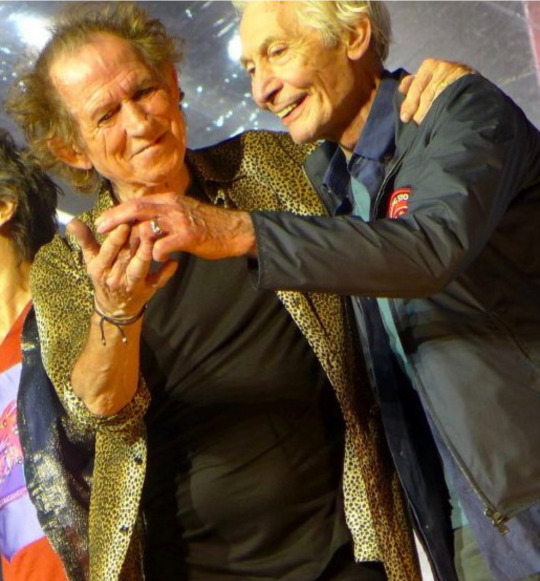
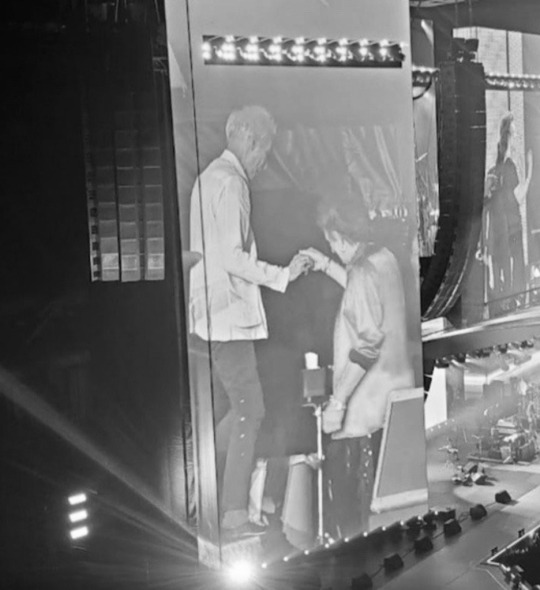
Also a bonus shout out to the best Keith and Charlie photo where Charlie technically isn’t in the picture:
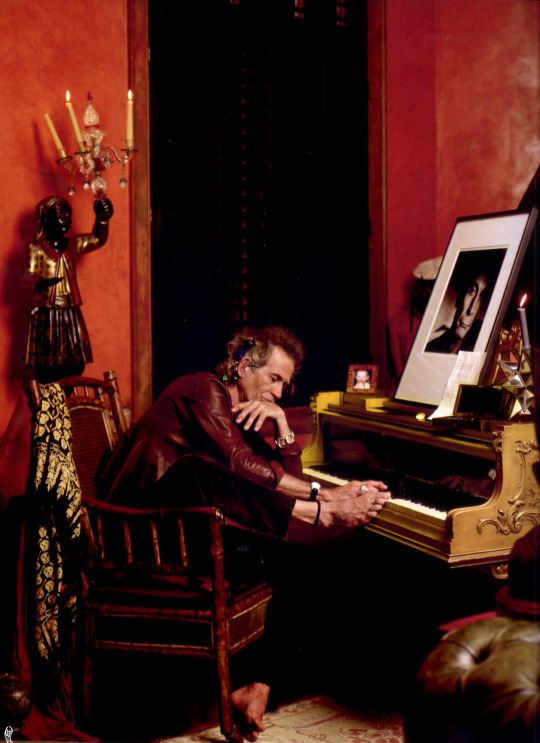
For the top 5 Keith songs, also in no particular order:
Hate It When You Leave (Main Offender, 1992)
Most of Keith’s solo songs are either about getting screwed over by a woman (and deserving it) or missing somebody in a long term relationship. This is one of my favorite songs of that second genre, I admit partly because it reminds me of a very particular part of my life, but also just the lyrics, the beat, and his voice play beautifully together. It’s an aberration for me in that most of the Winos songs I enjoy are the ones where Charley Drayton is on drums, because he has a lighter touch that suits Keith better.
Alteration Boogie (Unreleased Voodoo Lounge Outtake, 1993)
youtube
Voodoo Lounge is a great album that also has a lot of outtakes from the studio sessions floating around online (there were 75 demos from the whole process which was an unusually large amount for them), but this is probably my favorite Keith solo piece. It’s a song about and sung to Charlie (who joins in on drums halfway through) and it’s the most unhinged thing you’ve ever heard. Keith composed an entire 5 minute song about Charlie’s personal, how his trousers hang, and his ass, among other topics, seemingly on the fly. It’s a really interesting insight into whatever is going on in his head.
How Can I Stop (Bridges to Babylon, 1998)
I think most of Keith’s best ‘solo’ music really comes from him doing his own thing as a vocalist within the Stones. Especially because he has a tendency to strip things down and do almost everything with just himself and Charlie, plus occasionally one or two other people (Stu, Pierre, etc). It’s an emotionally devastating song (“You look at me, but I don’t know what you see/A reflection, baby, of what I want to be/I see your face and I want to roll with it…”) and the music itself more than matches the lyrics for quality. Wayne Shorter guested on the song and the last minute, which is just Charlie and Wayne going back and forth on sax and cymbals, with a little piano backing, genuinely gives me chills. It also shows how Keith’s generosity as a musician and his love of Charlie works in his favor, because that duet between them makes the song.
Love Hurts (Tribute to Graham Parsons, 2004)
youtube
It’s a cover, not a song Keith wrote himself, but I think it really suits his style/content as a solo artist and he makes it really work with his voice here. Norah Jones also works fabulously as co-vocalist, I think he actually tends to harmonize better with women (Sarah Dash, Norah, Sheryl Crow, Lisa Fischer, etc) live than with Mick.
Losin’ My Touch (Forty Licks, 2002)
I’m a sucker for all of Keith’s ‘sad old man at the end of a long term relationship’ songs, like “This Place Is Empty”, but this song (which was one of two originals added to a 40th anniversary greatest hits album) is really lovely. It’s a very classic Keith only on vocals/no back-up, drums, piano, and a bit of guitar, and I think that’s often how he sounds best.
I wouldn’t put it in my top 5 solely because of how horribly the production of the song was mangled by Andrew Watt, but Keith’s one solo song off of Hackney Diamonds, “Tell Me Straight” has absolutely gorgeous, devastating lyrics. It’s almost certainly his Charlie song, and both more beautiful and sadder when you consider the writing in that light.
9 notes
·
View notes
Text

There are 6 birds that wake me up in the early morning with their song. Bewick's Wren, Black Phoebe, American Crow, Song Sparrow, Oak Titmouse and the House Finch
Here is the Black Phoebe ✨✨✨
A Black Phoebe symbolize wisdom and hidden knowledge. They've also seen as life is ever revolving and ever changing, so to stay on your toes. They also remind us not to jump forward hastily to take your time and be patient. They also teach us to use our voice effectively.
When viewed through a spiritual lens, the Phoebe imparts sacred wisdom to those attuned to its lessons. Some of the core elements of Phoebe’s significance include:
Faith – unwavering belief despite uncertainty
Optimism – embracing hope
Rebirth – renewal after stagnation
Patience – persevering despite delays
Swift Action – decisively seizing opportunities
Guidance – reliably orienting others
The Phoebe is a mentor for overcoming adversity through faith and fortitude. Where others may falter when tested, the Phoebe prevails by tapping into a higher power. The bird’s spirit reassures us that inner light illuminates even the darkest hour if we trust in the dawn. Its wisdom nurtures spiritual resilience.
In many shamanic belief systems, animals can appear to individuals as spirit guides called “spirit animals.” Often, spirit animals showcase attributes and powers the person is called to embrace themselves.
As a spirit animal, the Phoebe signals a time of spiritual renewal. When the Phoebe visits you, it means you are on the brink of a new beginning, professionally or personally. While the path ahead may seem uncertain, your spirit animal Phoebe brings the gifts of optimism, swift action, and fearlessness.
By affirming your connection with the Phoebe, you harmonize your psyche with the bird’s ascendant energies. As you advance through unknown terrain, allow the Phoebe to lift your spirit and reveal invisible currents and thermals to ride. Through faith, all is possible. https://richard-laeton.pixels.com/featured/black-phoebe-richard-laeton.html
7 notes
·
View notes
Text
youtube
Bruckner – Symphony no.7 in E Major (1883)
Every now and then I see a composer described as “you love em or hate em”, and the longer I listen to classical music and see how people talk about it, the more I think this attitude can be used for any artist. Especially since extreme opinions are algorithmically given the most attention, and our way of communicating our tastes is equally encouraged toward extremes and hyperbolic language. Nothing can be “just” good, or ok, or interesting, or flawed; it’s either the best, or the worst thing ever. But maybe that attitude is more for Netflix shows or the latest Hollywood movie than for classical music.
Anton Bruckner didn’t escape this mentality despite living nearly two hundred years before the digital era began. When he was alive, the divisiveness in the public discourse was due to living and working in Vienna while loving Wagner. Side note on the “War of the Romantics”; on the aesthetic side there was the disagreement between developing traditional forms (the side of Brahms, C. Schumann, & supporters) versus letting new views on harmony and subject matter dictate how to structure music (Liszt, Wagner, & supporters). But there was another significant side that isn’t always focused on; being supportive of Jews, or being anti-Semitic. Not only was Wagner a musical radical in the way he conceived of opera, musical time, and harmonic development, but he was also a vocal anti-Semite, and his general dogmatic way of insisting on his views for every other subject was just as strong when it came to his bigotry against Jews. Supporting Wagner’s side of the ‘war of the Romantics’ didn’t only mean to support the new music aesthetics; it also implied that you were part of a growing movement of anti-Semitic German nationalism.
I only bring this up because I can assume that the hostility that Bruckner faced from the ‘conservative’ side of Vienna – including the ‘villain’ of Bruckner’s life story, music critic Eduard Hanslick – is more understandable if the stakes are higher and more consequential than “the music was too long and I don’t get it”. Despite his love for Wagner, Bruckner was more akin to the Wagner fans today who enjoy the music while ignoring or outwardly dismissing the evil side of Wagner’s art. I recall a story about Bruckner (one of the many stories used to talk about his ‘simple’ personality) where he had attended Gotterdammerung, and was enthralled by the music from beginning to end but asked “why did they burn her at the end?”. The music was more compelling to him than the content of the opera’s plot.
That could explain Bruckner’s musical aesthetic; taking after Beethoven’s 9th, focus on abstract music as the source of drama, but expand the use of harmonies, drama, and volume as if it were a Wagnarian opera. Its why, to me (and other fans), Bruckner’s symphonies feel like an emotional or spiritual journey despite being abstract music with no “meaning”. It also is why I’ve avoided writing and posting about Bruckner before. Like Mahler, it’s hard to capture the music in words and articulate how I feel about what’s happening in the music, but I’ve covered all of Mahler’s symphonies because I’d loved him a lot more than I did Bruckner. Only recently has my view of Bruckner warmed from “I like him sometimes if I’m in the mood” to “I love him and can’t get enough”.
Really by accident, or fate, I decided to listen to this symphony again two weeks ago, and Bruckner finally ‘clicked’ with me. I’d first heard him by picking up a few cds from my library, and putting him on in the background while I played old video games (in this case, Age of Empires 2). I thought he was epic, but hard to sit through and unless I was in a “Lord of the Rings” mood, I didn’t want to listen. A few weeks ago, Richard Atkinson came out with a video on Bruckner 6, which made me want to listen to him again. I decided to listen to the 7th again, and I finally connected with Bruckner’s soundworld.
One more note before going into the 7th; another reason Bruckner’s music was criticized in his life; it was for a relatively conservative orchestra where each section is noticeable. But that was because Bruckner was not trying to blend colors in an ‘orchestral’ way, but rather how one would write for the organ, which was his main instrument. So when we hear a Bruckner symphony, we are hearing the sounds he created for church services magnified through an orchestra, a kind of recreation of ‘sacred’ music but in a secularized context where one doesn’t have to think about any specific doctrine or view of the divine, instead you experience a sublime connection that is more uniquely ‘your own’. This is one example of how music was being treated as a replacement religion in Europe after the Enlightenment.
The opening movement of the 7th to me feels like a sunrise with the slow unveiling of the main melody. which rises in an arpeggio that evokes the drone prelude to Das Rhinegold. From this comes a seemingly endless melody that gradually develops with a group of themes played through. Long songlike melodies are rare for Bruckner’s opening movements – usually he uses motivic patterns – so the multiple distinct melodies in this work helped to give it the unofficial nickname “Lyric”. As the music builds tension we see another example of why some ‘hate’ Bruckner: intense build ups are created, but instead of climaxing they ‘stop’ and start over. After this first bursting episode, we get a dance-melody that, to me, sounds the most like “organ music”. Bruckner picks these melodies apart into his own way of development; counterpoint and modulation. In a way, bringing Bach and Schubert together. Every Bruckner opening movement ends with a grand coda where the music reaches its most extreme height, finally bringing us the climax we’d been denied by the previous build ups. Here it is only the first part of the opening melody, the rising arpeggio, over a long pedal point, and the volume and scope of the music rises with it into a transcendental glow of sound.
The adagio is the most famous movement of the work because it also has a long passionate melody, here in the minor and with darker colors from the use of Wagner tubas. Bruckner wrote this movement knowing that Wagner was dying, and it is like a musical memorial to him. That may sour the music for a lot of people, but it could be better to think of it as music in memorial of other music, for its own sake, and not for any toxic ideologies. This movement has two main melodies; a somber melody with unexpected modulations, and a bittersweet melody that tries to be uplifting. This movement is unique for a Bruckner symphony in having a cymbal clash, which was rumored to have been added to the score the moment Bruckner had heard the news of Wagner’s death. But that story isn’t true, the actual story is that a friend told him he should use a cymbal instead of a triangle for that moment. As usual, the more interesting ideas stick around to form a kind of mythos over music that we love.
The scherzo movement, again following Beethoven’s lead, is thunderous. The main melody is based on arpeggiated open fifths falling downward, and when the full orchestra blasts it, it feels like being under a cascading wave. Again, the writing is organ-like in the colors in the sections as they contrast each other like hands and feet over the keyboards and pedals. The trio makes me think of the kinds of ‘schmaltzy’ Viennese dances that would come up in Mahler’s symphonies, just one example of how Bruckner influenced Mahler’s style.
The last movement makes me think of the symphony as being symmetrical: the first half was made of two long movements, one bright and transcendent in the major, the other darker and tragic in the minor. The second half is made of two shorter and livelier movements that have the same major/minor characters. Here, the finale is a dance that opens with the violins playing the main melody, followed by a counter melody that’s more for rhythm than humming along. These ideas play in counterpoint in the winds until dying down in the strings, introducing a softer group of melodies. Later a large wave of unison octaves play out across the full orchestra, an inversion of the opening dance melody. This movement is in arch form, where the order of melody groups plays again in reverse order (1, 2, 3, 2, 1), though melodic ideas are used repeatedly, in the Bruckner fashion of breaking up motivic blocks. As with his other mature symphonies, the movement ends with another grand coda, where the arpeggio of the opening melody to the whole symphony returns, and reveals that the main theme of the final movement is based on this melody.
Movements:
Allegro moderato
Adagio: Sehr feierlicht und sehr langsam
Scherzo: Sehr schnell - Trio: Etwas langsame
Finale: Bewegt, doch nicht schnell
#Bruckner#symphony#orchestra#classical#romantic#blog post#history#music history#classical music history#classical music#orchestra music#symphony orchestra#romantic music#romanticism#19th century music#Anton Bruckner#Bruckner symphony#Youtube#Happy Birthday
43 notes
·
View notes
Text
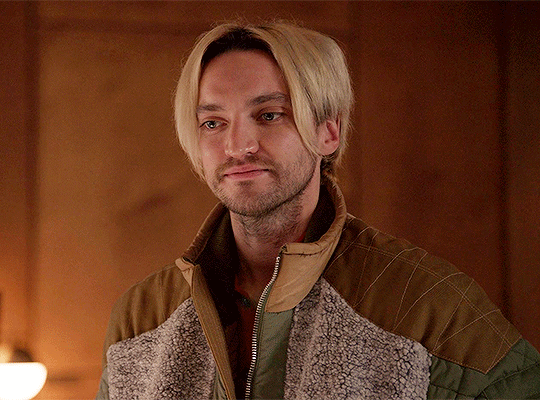
(Richard Harmon) [THE DISASTER]. Please welcome [LINK MURPHY (HE/HIM)] to Huntsville, WV. They are an [32]-year-old [VISITOR] who lives in [THE COMMUNE]. You may see them around working as a [POST OFFICE WORKER]. Poor unfortunate soul. We’ll see if they survive.
Full Name: Lincoln Link Scott Murphy
Birthday: October 31
Age: 32
Hunter or Gatherer: Neither
Sexuality: bisexual
Height: 5'9
Relationship Status: single
The youngest of three and the only boy, Link was his father’s legacy - or so he thought. The boy was extremely bright, and excelled in reading as well as writing from a young age. His oldest sister, Ashley, often treated him like her personal baby doll, but the middle Murphy child, Harper, was only a year older, and the two grew up close as twins.
As far as school went, the youngest Murphy found it a breeze. He started going by Link early on, always hating his full name, especially the way it made him sound like an old man, but despite that, he made a lot of friends. Bright and outgoing, it seemed like Link was gearing up to live up to every hope his father had dreamed of.
Creative writing was a subject he took to like paper took to fire, and writing poetry became his go to outlet in middle school, suddenly feeling everything and nothing all at once. As his poems became darker and harder to discern, Harper reached out to their parents, concerned for her brother. It was just before Link went to high school that he was diagnosed with depression, and put on medication for it.
High school was a whole new world for Link - for the worse. He fell into a group of kids that spent most of their days smoking cigarettes in the back parking lot instead of going to class, and partying all night. This group introduced Link to cocaine, and it was all downhill from there. Soon he was smoking regularly, and ignoring his meds in favor of the white power that made him feel like he was on top of the world. Eventually his parents caught on, and his father was furious, all but disowning him at that point, and it was then that Link just decided to run for it.
It was a plan that had been in the back of his mind for a while, but it was supposed to be after graduation - but at sixteen Link found himself dropping out of school to travel around the states in the back of a van with his three best friends, relying solely on each other and drugs to get through and over any obstacle the world threw at them.
So began what Link would consider the greatest adventure and time of his life. While Alaska and Hawaii were out of the question (none of them had the money or the passports), the left New Jersey and stopped in every state in the continental US, resorting to theft when money was tight, and flooring it to avoid getting caught. As time wore on, however, it became harder and harder to make it.
How it even got as far as it did, Link couldn't tell you. All he knew was that half of his life was spent in the back of a van, and he was tired. Half the group had decided to take permanent rest stops, finding a state that suited them best to stop and stay in, promising to call and keep in touch - which, to their credit, they did, but it wasn't quite the same. It felt like a betrayal to Link in a way he couldn't explain.
He never meant to roll into Huntsville - but then again, who does? While being grounded means he's forced to become part of a community, he still often seeks the release that drugs bring him, trying very hard not to think about what's going to happen when the people that wander into town don't bring all the right supplies, because the last thing he wants to do is be forced to get sober in a town full of nightmares and monsters.
3 notes
·
View notes
Text
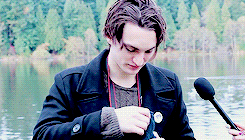
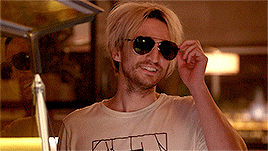
⸻ RICHARD HARMON. HE/HIM / have you ever heard of RECKLESS by you me at six? it describes LINCOLN LINK MURPHY to a tee! the thirty one year old BARISTA AT DAILY DRIP was spotted walking down the beach - do you know them? would you say HE is more snarky or more CREATIVE instead? anyway, they remind me of old poetry, handwritten notes in the margins of books, late nights driving down empty highways, and the constant smell of nicotine, maybe you’ll bump into them soon!
mental health tw, drug use tw, self harm tw
The youngest of three and the only boy, Lincoln Scott Murphy was his father’s legacy - or so he thought. The boy was extremely bright, and excelled in reading as well as writing from a young age. His oldest sister, Ashley, often treated him like her personal baby doll, but the middle Murphy child, Harper, was only a year older, and the two grew up close as twins.
As far as school went, the youngest Murphy found it a breeze. He started going by Link early on, always hating his full name, especially the way it made him sound like an old man, but despite that, he made a lot of friends. Bright and outgoing, it seemed like Link was gearing up to live up to every hope his father had dreamed of.
Creative writing was a subject he took to like paper took to fire, and writing poetry became his go to outlet in middle school, suddenly feeling everything and nothing all at once. As his poems became darker and harder to discern, Harper reached out to their parents, concerned for her brother. It was just before Link went to high school that he was diagnosed with depression, and put on medication for it.
High school was a whole new world for Link - for the worse. He fell into a group of kids that spent most of their days smoking cigarettes in the back parking lot instead of going to class, and partying all night. This group introduced Link to cocaine, and it was all downhill from there. Soon he was smoking regularly, and ignoring his meds in favor of the white power that made him feel like he was on top of the world. Eventually his parents caught on, and his father was furious, all but disowning him at that point, and it was then that Link just decided to run for it.
It was a plan that had been in the back of his mind for a while, but it was supposed to be after graduation - but at sixteen Link found himself dropping out of school to travel around the states in the back of a van with his three best friends, relying solely on each other and drugs to get through and over any obstacle the world threw at them. And this worked for a while, but it wasn’t sustainable.
After four years the poor eating, smoking and constant drug use caught up to Link - the depression slammed into him hard, and it felt completely inescapable. So he and the girl he was seeing at the time decided to make a pact, both of them agreeing to leave this world because it had to be better than enduring whatever there was left. Thankfully, their friends found them in the nick of time, and it was a huge wake up call for all of them.
Link spent a little while in an inpatient facility, paid for by his sister, Harper - the only family member he bothered to talk to after running away, and after his near death experience, he decided he needed to actually do something with his life. He got his GED and decided to take a few college credits in creative writing, not necessarily to go anywhere with it, but just to find passion in something again - especially now that he was properly medicated.
Recovering in New Jersey was fine for a while, but not overall sustainable. He bounced around the east coat before picking Daggerpoint at random, deciding to try to make a stable home (his therapist suggested it, after all) and it was a much needed change for the boy. Getting into a routine of meetings to help his sobriety and keeping busy, it was one of the healthiest decisions Link had made for himself in a while.
Link is bright, with a witty personality and an insatiable appetite for books and poetry; he’s maybe a little too much made up of coffee and cigarettes, but he figures out of all the vices he’s had in the past, these ones aren’t so bad.
2 notes
·
View notes
Text

𝐀 𝐃𝐀𝐑𝐊𝐄𝐑 𝐒𝐈𝐃𝐄, everyone always has one, but how dark will it be, it’s dependent on the person itself. how dark can you be ??
✨ independent, highly selective, and private multi-muse blog with VERY mature themes including txboo, will be present, you have been warned. heavy triggers will be tagged, smut will not. minors don’t interact. written by teddy, he/they, 25 +
affiliates: @bvssybvys
✨ open starters ✨ muses ✨ wishlist✨ kxnks ✨
memes ✨ wanted opposite ✨ most wanted
guidelines under read more
INDEPENDENT & SELECTIVE
this blog is an independent multimuse blog. all my charas are gay. i am not affiliated with the faces or the shows that the canon characters are in. this blog will have thread that are very taboo so if you’re not comfortable, don’t follow this account. and if i don't follow you or don't have active threads, please don't interact with me. i'm just selective with who i write with.
WRITING STYLE
i like to use small text with icons and small gifs or gif icons, and mostly do short threads that includes a paragraph. can write longer if the vibe is there. but shorter stuff tend to get my attention and i go faster. also cut your post if you can please. i use beta and xkit unwritten.
SHIPPING & CHEMISTRY
i’m a ship whore. but it’s definitely easier if our writing chemistry and the character’s chemistry is there. but yea, here for all the ships.
SMUT & NSFW
listen, there is lots of smut, this blog is mainly for all the smut writing honestly. so i won’t be writing with characters under 18. i’m of age, and i dont feel comfortable writing with anyone who is under the age of 21. so be 21+ pls. i won’t be tagging the smut on here, but will tag most triggers.
ACTIVITY
i am currently employed, so i’ll be semi-active, but apologies if i do disappear! but if i do, i always come back, unless im dead lol, ok morbid, but yea, i’ll always return 💖
CROSSOVER/OC FRIENDLY
i am very crossover and oc friendly so don’t be afraid to hit me up if you and i have similar writing styles. i’m down for rping with chou all.
GRAPHICS & ICONS
all of the resources i use are NOT mine, so kudos to those that have made them. if i make any graphics though, don’t claim as your own! 😡😡
REBLOGGING
if you could all be kind to not reblog gif/photo sets from my blog. just reblog from source, it’s easier to keep my activity clean and only be my threads, but i won't like go ballistic if you do so here and there. thank you fam! 💖
OUTLET
this place is just for fun. so don’t bother me too much about this blog.
BANNED FC’S
i don’t feel comfortable writing with fcs that are under the age of 21. the only exception is kit connor and a couple others. but i’m pretty open when it comes to fc’s but here a few that i’m very ehh/nope for me
underage fc’s
deceased fc’s
most influencers
most kpop singers and singers in general ( unless plotted )
cast of shameless ( except jeremy allen white or steve howey )
stranger things cast
individual actors tho are here:
ansel elgort
austin abrams
avan jogia
blake jenner
bill skarsgard
benedict cumberbatch
cillian murphy
chris pratt
colton haynes
dane dehaan
darren criss
dylan sprayberry
elliot page
ezra miller
johnny depp
misha collins
richard harmon
robert sheehan
robert downey jr
timothy olyphant
i will add more as my memory picks up.
1 note
·
View note
Note
hello arik!! for the ask game 😋 can i get barty pls? <33
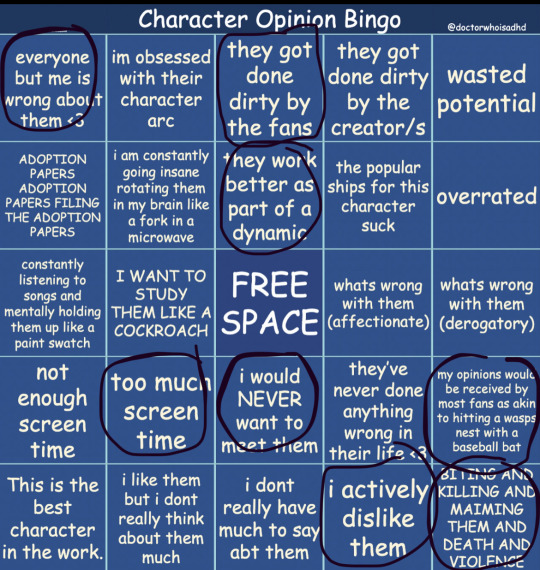
Okay I did orchestrate this with nat because I wanted to go on a rant THANK YOU LOVE YOU5EVER AND EVER
99% of what I see hear & read about barty crouch jr makes me Roll My Eyes
The exceptions 2 this is Art heist Baby and Of His Bones & this is not a remark on other works he’s in I support u in your bcj shenanigans he’s just not 4 me.
I even have grown to like some songs that have rosekiller vibes what can I say I evolve sometimes.
BUT I think I have found my chemical concoction for his character that makes me like him!
Here is that recipe because apparently I’m not gatekeeping it anymore
He is a seer (I have a wip called heathens of the hawthorn tree that explores this)
Richard Harmon fancast
Has 2 sisters and is raised by a single mom
Gets put through so much trauma he has to resort to living on a farm for the rest of his life and struggles to integrate himself into society
Hikes as a hobby
Does magic mushrooms & grows magic mushrooms
Dog person and owns pit bulls and knows they are lovable beautiful dogs who have never done anything to anyone ever
Ravenclaw & his best friends are Sybil Trelawney and Pandora Rosier—has a crush on her twin brother
Learned fencing cuz he thought it was a cool muggle thing
Basically he’s still a douchebag but he’s kinda like that guy in Booksmart with the fancy car who’s best friends with Gigi if you’ve seen that film you’ll get me, if not? Sorry ur loss.
2 notes
·
View notes
Text
Jeff Buckley
FULL EPISODE
Broadcast Sun 10 Aug 2014 at 7:00pmSunday 10 Aug 2014 at 7:00pm
Space to play or pause, M to mute, left and right arrows to seek, up and down arrows for volume.
LISTEN
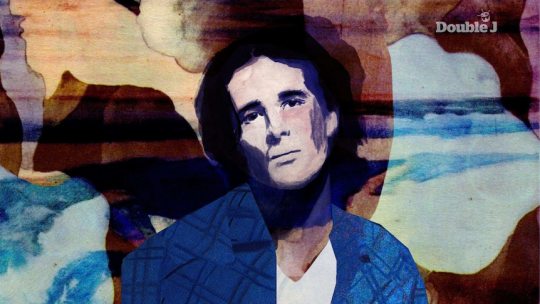
Jeff Buckley's voice is one of the most enduring sounds of the 1990s.
His music still holds power, despite it being 20 years since the release of his only studio album Grace and over 17 years since his untimely death.
Interviews with Buckley expose his unpredictable character ranging from quiet and guarded to candid and revealing. Either way, one thing’s for sure: Jeff Buckley could never be relied on for an easy interview.
"He had a whole mythology that was kind of growing up around him," musician Jen Cloher remembers. "He was a bit edgy. You couldn't quite categorise Jeff Buckley. I think there was a bit of intrigue as well. Who was this guy? It was really fresh."
youtube
Rare Jeff Buckley interview
Soundgarden frontman Chris Cornell, who was a friend of Buckley’s, says he possessed a star quality.
"What made him that person? I have no idea. But he was that person," he recalls.
"He was this amazing, unique kind of spirit that everyone was kind of drawn to. He had that quality that superstars have. But he unfortunately didn't live long enough for that to be exposed to everyone."
Related article - Hallelujah: The song that took a decade to connect
Download the Jeff Buckley J Files podcast on iTunes
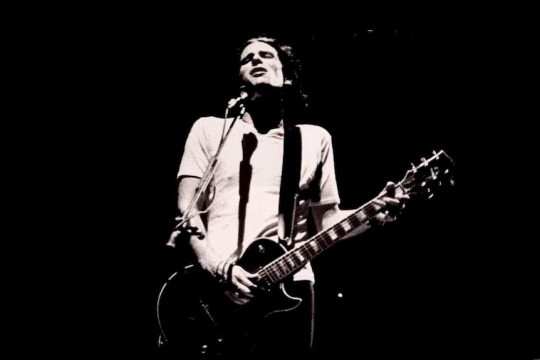
CHAPTER 1
Kangaroo
While in some parts of the world – his native USA among them – Buckley became a musical hero in the wake of his tragic death, Australia embraced him as a superstar while he was alive.
Jeff Buckley's mother Mary Guibert assured triple j in 1998 that the love we showed Buckley was not only acknowledged but very much reciprocated.
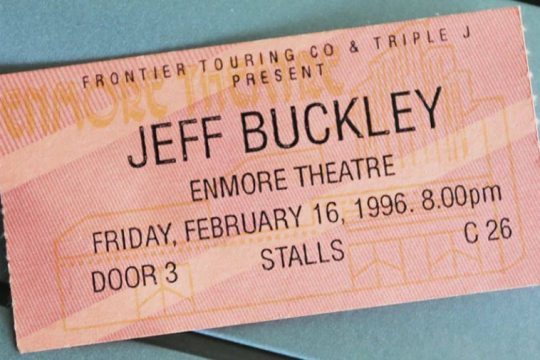
"He loved Australia, adored Australia," she said. "It was so exciting for him to be there, the response was that palpable for him.
"He really wasn't ready for the depth of the response. It was really gratifying to him. There's something about the Aussie spirit, that kind of independence, that struck a harmonic note with Jeff. He was always so experimental that he didn't always get that really roaring enthusiastic reception in the US, which was alright with him. He liked just being a songwriter and admired for his singing and having a controlled following rather than some kind of raging success.
"But the genuine nature I think of the [Australian] reception, just the way the fans responded to him in concert, the feeling he would get from the people in that performance experience, which he loved to do in the first place, was really a strong and powerful one. It was good for him."
He visited Australia twice in his relatively short career. A short promo tour that saw him in small clubs in Sydney and Melbourne in August and September 1995. Just five months later he had a mammoth theatre tour, selling out some of the biggest rooms around the country, sometimes repeatedly.
The reviews were largely glowing.
"With Jeff’s first tour in 1995, there was a considerable level of excitement and anticipation," triple j Music Director Richard Kingsmill remembers. "Australia had had plenty of time to live with Grace, it had been out for exactly a year before his live show got here.
It was, and still is, as close to a perfect concert I’ve ever seen.
Richard Kingsmill
"Everyone knows now that Grace is a classic. But even after a year of it being out, he was still more a cult artist getting great reviews than he was a superstar. The shows booked in Australia on that first tour were pretty modest size rooms – nothing like the big theatres he played on his follow up tour here in 1996."
Kingsmill remembers the opening show of that first, intimate tour at The Metro in Sydney.
"It’s fair to say the crowd was full of as many local musicians as there were punters," he says. "As soon as he started playing, and then when he sang, the room was his for the next 90 minutes. It was, and still is, as close to a perfect concert I’ve ever seen. He knew this was an important show and that there was a lot riding on it for his growing popularity here.
"He and his band were on fire that night. All in his camp agreed afterwards it was a good one. For me, when towards the end of the night he started dropping in really challenging covers like Big Star’s 'Kangaroo', it had gone way beyond being just a great gig. It was simply a thrill to be a music fan and there that night to soak it all up."
Wendy Tuohy raved about Buckley's return to Australia, writing for The Age in February 1996.
"A fragile figure with a boy's white arms told us wrenching stories of loss, pain and aching," she wrote.
"He used a musical language so beautiful - and sang at times in a voice as rich but tortured as a male Nina Simone - that the pain became a thing of beauty.
"We do not know the exact origins of Jeff Buckley's intensity, or what causes the compressed tension that sometimes makes him rigid at the microphone, but the ’lots of bad things’ he speaks about to journalists, the ‘lots of irreparable damage... the agony of learning all over again’ certainly came through in his coiled-spring stage presence."
Grace has spent 52 weeks in the ARIA charts since its release, even sitting in the top ten back in 1995. The record only managed 149th spot in his native US, though Buckley's mother believes this was due to his label wanting to build his profile slowly.
"Part of that was by intention, I'm sure," she said. "I've seen the marketing plans all throughout and they were all a very low-key, take it easy, let Jeff develop kind of thing."
There was truly an affinity between the artist and the people of this country. If you ever poured your heart out to Jeff Buckley via fan mail, there's a good chance he took what you wrote to heart.
He got a lot of very touching letters from Australian fans which he kept as keepsakes. And he was not a keeper of things.
Mary Guibert, Jeff Buckley's mother
"He got a lot of fan mail from the Australian fans too," Guibert said. "He got a lot of very touching letters from Australian fans which he kept as keepsakes. And he was not a keeper of things. But there were some really powerful letters that he got from some of the Australian fans about how his music touched them. I think that really endeared them to him as well."
Photographer Merri Cyr was a close friend of Buckley's throughout his life and took the iconic photo that adorns Grace's front cover. She also attests to how much the singer loved our country.
"I know Jeff loved Australia, particularly he loved Melbourne," she remembers. "He talked about that quite a bit. Australians really connected with Jeff immediately and embraced him, they loved him.
"I'm glad he got to experience that while he was alive. Not just adulation, but the love."
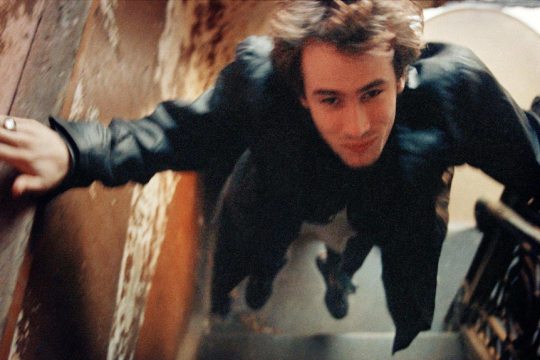
CHAPTER 2
Wait In The Fire...
1994's Grace was Jeff Buckley's only studio album. While collections of material – demos, live recordings, rejected studio sessions – all surfaced after his passing, he left just one finished LP behind at the time.
The album was made at Bearsville Studio in Woodstock, New York, with Andy Wallace, whose production credits at the time were largely for heavy metal and punk rock bands. Making the record in the country was a way of keeping Buckley from distraction, allowing him to channel all of his energy and love of experimentation into making the record.
"I didn't know how beautiful the place would be before I got there," Buckley explained when Grace was released. "I went up there and the place is king, it's absolutely great. So we set up there and we worked for like five or six weeks.”
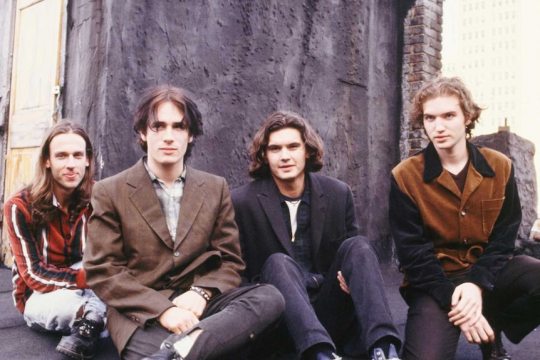
The core band for the Grace sessions featured Buckley, bassist Mick Grondahl and drummer Matt Johnson, three musicians who had known each other for just six weeks before heading to the studio.
"The whole process of this album was ass-backwards," Buckley said. "The studio was chosen, the producer was chosen, didn't have a band. I thought I'd get it together by that time. I knew I was gonna work with Andy before we got anything solid. We talked about how to record things and the way I wanted to do it. I wanted to get a big room, with the band and the material, 12 mics, live. Virtually we did that."
The recording space was setup in a way that would allow for the band’s ever-changing dynamic, according to author Daphne A. Brooks.
"Wallace and the group set up two different full band recording situations – for louder and softer ensemble playing with two different sets of drums all miked up and set to go at any time. Wallace was always ready with tape rolling,” Brooks wrote in her book Jeff Buckley's Grace, part of the 33 1/3 series.
"An additional third performance area with microphones was set up with a riser, similar to a small stage in a cafe. From time to time Jeff would sit down and play songs.
"There was no set plan or schedule for these recordings, but these sessions clearly provided a fluid bridge between Buckley's solo work and the structure for his new experimentation with the band."
Many consider Grace to be a classic album. It gets the kind of praise reserved only for truly game-changing records. It has earned countless five-star reviews, frequently appears at the pointy end of "best album" polls and has no shortage of glowing recommendations.
"I still think it's one of my all time favourite albums. It's just timeless," Big Scary's Tom Iansek says. "I think you can put it on now and it doesn't sound dated. I guess this just comes down to the quality of the songs. They're that good that they still have relevance and they still bring up the same emotions and evoke the same feelings as they did years ago."
Jen Cloher agrees.
"Grace is an album that stands up today, it's a classic," she says.
"It's a classic album and I think it will go down in the history books – it already has – as one of the most accomplished debut albums of all time. Amazing songs."
Speaking to Mojo magazine in 1997, Patti Smith Group guitarist and Nuggets co-curator Lenny Kaye said Grace was merely hinting at bigger things to come.
"Grace was a great beginning, staking out all the stylistic territory," he said. "I think he was getting ready to make his first real record, working out what he wanted to say without letting that wonderful voice distract people from his internal emotion. I'm sure he wanted to be more than just a pretty face and voice. He had a vast plain to work in and he never really got to work it."
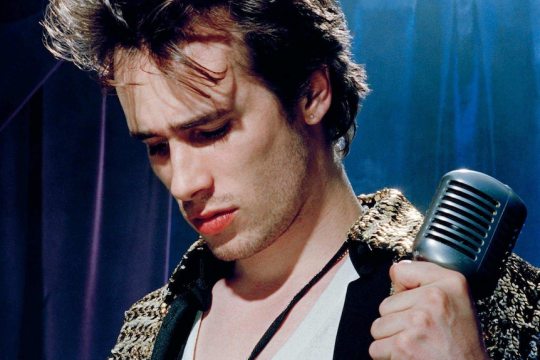
CHAPTER 3
Songs To No One
Jeff Buckley's playlist of tracks that mattered to him
On his first Australian tour in August 1995, Jeff Buckley visited triple j to talk to Richard Kingsmill about six songs that mattered to him at that time.
Music's power was clearly important to Buckley, as it was something he would connect to the key moments in his life.
"Music needs time to live in and sometimes that time is a memory, a childhood memory or a really dramatic memory of a fight, a loss, a death, a birth, a movie," he said. "Something totally ordinary – if a song captures it, those are the things that keep time in your life.
"The day I heard 'How Soon Is Now', the day I heard 'Yeh Jo Halka Halka Suroor' by Nusrat Fateh Ali Khan, the night I heard Górecki's Third Symphony, the day I heard 'Ain't No Mountain High Enough'..."
Diana Ross – 'Ain't No Mountain High Enough'
youtube
Diana Ross Aint No Mountain High Enough
Buckley began by recalling hearing Diana Ross' version of the classic soul song 'Ain't No Mountain High Enough' as a five-year-old boy.
"Fullerton, California. Pritchard St house. We lived next to a railroad track and an airport simultaneously," he reflected. "My mother had a garage full of weird clothing she would make and she had her own business called Elegant Funk. I would roll joints for my parents."
When Kingsmill asked if his childhood was good, Buckley's response spoke volumes.
"Eh," he shrugged. "It was a childhood."
The Grifters – 'Get Outta That Spaceship & Fight Like A Man'
youtube
The Grifters Get Outta That Spaceship
Jeff Buckley's love of The Grifters is well acknowledged, particularly by his Australian fans. He loved the band so much that, on his second tour of Australia in 1996, he brought them along to open the shows.
Buckley was first turned on to the Memphis indie rockers in the live arena.
"For some reason we ended up in Iowa City and opening up for us was The Dambuilders, a really rocking band from Boston, and The Grifters and then us. I don't know what the hell happened – it shouldn't have been like that, but it was and that was how I saw The Grifters. It was just great."
Vocalist David Shouse’s emotion is intense in this track, a trait Buckley seemed to admire above all others.
"Dave's voice... He hurts real bad. He hurts real good."
youtube
Bad Brains – 'How Low Can A Punk Get'
Bad Brains - How Low can a Punk Get
You wouldn't expect Jeff Buckley to be a hardcore punk aficionado after hearing his achingly beautiful songs, but Bad Brains were an important part of Buckley's introduction to New York City.
"It was D.C. hardcore and New York hardcore and hardcore all over the place. They just came out and they were so ahead of everything it seemed. Not ahead, they just nailed it.
"My introduction to New York for the first time, the first thing I heard was 'Re-Ignition', that changed my life. I Against I, that whole album...
"But the first Bad Brains album is the one that I love the most. It took a while for me to get into Rock For Light 'cos there's a lot of the same songs as on the first one and it's produced by Ric Ocasek from The Cars and it sounds really bright and clear, whereas the first one sounds muddy and evil. But I learnt to like it because there's songs on it you can't get anywhere else, such as this one."
Jon Spencer Blues Explosion – 'Blues X Man'
Jon Spencer Blues Explosion - Blues X Man
Jeff Buckley was a well-known figure around New York's Lower East Side. So it stands to reason that he was familiar with the Jon Spencer Blues Explosion, another popular act formed in that area around the same time Buckley was cutting his teeth at Sin-é.
Buckley hadn't yet seen the band live, but he certainly had some ideas about what it might be like.
"I pretend I'm Judah Bauer naked in my apartment sometimes," he told Kingsmill. "Sometimes I pretend I'm the back-up girls on this song."
Shudder To Think – 'Track Star'
youtube
Shudder To Think - The Recording of Pony Express
Pony Express Record was the first album Washington D.C. punks Shudder To Think released on a major label. It was 1996 and labels were still taking chances with loud, unique bands in the hope of another Nevermind. Shudder To Think never reached such lofty heights, but the record, mixed by Grace producer Andy Wallace, was an artistic triumph and remains critically adored.
"They used to be based out of D.C. now some of them are in New York. People think that I'm good. But this is a person, these are some people that I think are really good, really beautiful. You've never heard anything like this. There are too many things to choose from on this one, but I especially adore 'Track Star' – you'll see.”
The Patti Smith Group – 'Ain't It Strange'
This article contains external content that failed to load. It may have been removed or is no longer available.
Buckley was a huge Patti Smith fan. One little known fact is that Patti Smith had a profound influence on the now iconic cover of Grace, Merri Cyr explains.
"The image that was chosen for the album cover was an image that I didn't even notice on the contact sheets, and that I hadn't even made a proof of," she told Double J when asked about the now iconic shot.
"Jeff pointed his finger to it and said 'I want that one'. The reason he liked that photograph was that he could tell he was listening to music in that photograph. He could see in the image that he was listening to music.
"We were listening at that time that the shot was taken to a Patti Smith album, Horses. It was a funny thing, we both brought the same CD to the shoot that day. He was really digging into the music, so I got that moment. That's why he chose the image."
'Ain't It Strange' is from Smith’s 1976 album, Radio Ethiopia. Buckley initially said there were no words that he could use to describe the power of the song, but then couldn't resist trying to articulate what made it so special.
"This song sounds like a song of devotion in its strength," he said. "Her voice and her music and her words are all equally special and strange and penetrating and understanding. They all integrate.
"I can't separate her from her voice, I look at a picture of her and I can only imagine that sound coming out. Like a force of nature."
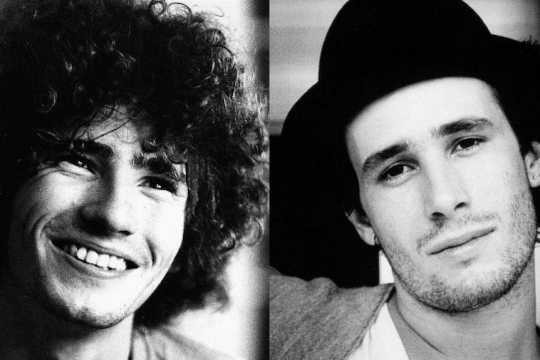
CHAPTER 4
The Man That Got Away
Jeff Buckley's father was revered folk singer Tim Buckley. The two were estranged up until Jeff was eight years old, at which point Jeff's mother took her son to see the folk hero perform live.
The two Buckleys spent a few days together following that show, but Tim died just a couple of months later from an overdose of alcohol and heroin.
Jeff could never shirk the unwelcome comparisons to his father that he garnered all throughout his career.
"It always came up," Merri Cyr remembers. "At his shows a lot of Tim fans would be requesting Tim songs. They'd say 'Play 'I Never Asked to be Your Mountain'' or something and he'd be like 'Fuck you!'. He just kept comparing himself to Tim and I think that's a sad thing."
Cyr noticed an element of competition that Jeff had with his father's legacy.
"I think there was this time when he was about 27, I remember him telling me 'By the time my dad was this age, he had seven albums already and he had slept with more beautiful women then I ever will'. So I think, unfortunately, he was in some competition with his father, but he didn't know his father so it was... I don't know if it's oedipal, but it's kind of definitely mythological."
I think, unfortunately, he was in some competition with his father, but he didn't know his father so it was... I don't know if it's oedipal, but it's kind of definitely mythological.
Merri Cyr, photographer
Mary Guibert believes that Buckley was beginning to become more comfortable being compared to his father, despite his early frustrations.
"I think he was becoming more comfortable with the constant comparison," she said. "He certainly was getting to a point where he could understand how a young man of 18, at the beginning of his career, could find it difficult to break through the wall that you build over the years between yourself and an estranged son, in the way that he and Tim were estranged.
"I think, in the process of becoming a man himself, he was able to understand and accept more the way things turned out and be more at peace with that. I think if Tim were alive today he would be so proud of his son. And if you were to ask Jeff, he'd be proud of what his father accomplished. He just felt that they both deserved to have their own place."
The soundtrack to my life! Mid-twenties, life overseas, breakups (Last Goodbye & Lover You Should've Come Over), get-back-togethers, my first born daughter is named Grace & now all 3 of my daughters love his music...it's so moving & ethereal...
Jacqui Smizutsu — Facebook
Despite their stylistic differences, Guibert said the way the two men approached their music was almost identical.
"I think the one thing that impressed him the most about his father's work was that it was really true to him, it was an extension of himself. He didn't hold anything back. In those two ways they were similar. But not because one was influenced by the other, they were just simply that way on their own. As individuals."
Guibert's comments echo a sentiment Buckley expressed to Rolling Stone in 1994.
"Separated all our lives, and now I'm right there in the [CD] bin next to him," he said. "His thing should stand on its own, so should mine. Otherwise, how else could I bring honour to it?"
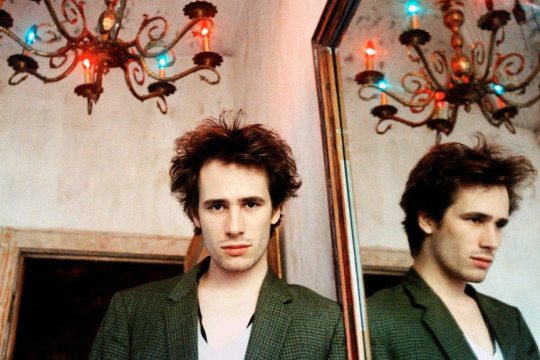
CHAPTER 5
Mystery White Boy
It's an easy, but fair, assertion that Jeff Buckley was complicated. His varied influences, his complex relationship with his father's legacy, the strange way in which his one true studio record was made and the deeply spiritual connection he had to music, that he often struggled to verbalise, all examples of this.
There can be no denying that the mythology of Jeff Buckley is a part of his appeal.
But what will always loom largest about Jeff Buckley is the 51-minute opus that is Grace, from the sweet, sustained harmonics that usher in the delicately beautiful 'Mojo Pin' to that one final falsetto croon that closes 'Dream Brother'. This will forever be Buckley at his most pure to his legions of current fans and the many who will continue to discover him in the years to come.
For a career that was so short, Jeff Buckley has left us with so much.
"Being a guy that's been to a lot of funerals for young people, the discussion comes up – the light that burns twice as bright burns half as long," Chris Cornell says.
"That's the way you treat the notion of a person that does well before they should. It's usually BS, it's usually a way of everybody just kinda dealing with it and feeling better about what happened. But in his case it was very true."
Broadcast 10 Aug 2014
16 notes
·
View notes
Text

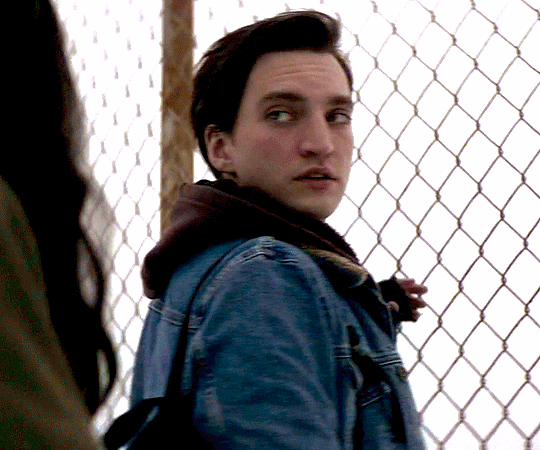
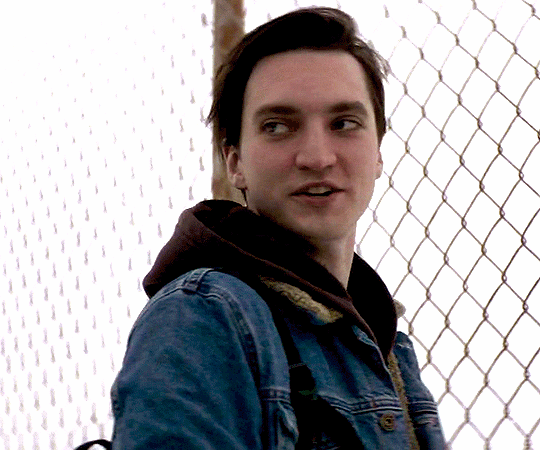

kirk lane
» I still see you
#I Still See You#Kirk Lane#Richard Harmon#richardharmonedit#the prettiest of the boys#like seriously now#Richard is a very beautiful looking person
2 notes
·
View notes
Text
i was bored so i ranked all of people magazines sexiest men alive to my personal preference
Hugh Jackman (2008)
Idris Elba (2018)
Matthew McConaughey (2005)
Harry Hamlin (1987)
John F Kennedy Jr (1988)
Denzel Washington (1996)
Paul Rudd (2021)
Adam Levine (2013)
Johnny Depp (2009/2003)
Chris Evans (2022)
George Clooney (2006/1997)
Jude Law (2004)
Brad Pitt (2000/1995)
Mel Gibson (1985)
Mark Harmon (1986)
Ben Affleck (2002)
Sean Connery (1989)
Channing Tatum (2012)
Chris Hemsworth (2014)
Dwane "The Rock" Johnson (2016)
David Beckham (2015)
Ryan Reynolds (2010)
Patrick Swayze (1991)
Tom Cruise (1990)
Bradley Cooper (2011)
Michael B. Jordan (2020)
Richard Gere (1999/1993)
Pierce Brosnan (2001)
John Legend (2019)
Blake Shelton (2017)
Nick Nolte (1992)
Harrison Ford (1998)
Matt Damon (2007)
3 notes
·
View notes
Text

Elliot Warren
El, to those he likes.
The Watcher
28
3/25
Hunter
(Richard Harmon) [the watcher]. Please welcome [Elliot Warren (he/him)] to Huntsville, WV. They are an [28]-year-old [RESIDENT] who lives in [TOWN]. You may see them around working as a [Manager at the Sasquatch]. Poor unfortunate soul. We’ll see if they survive.
Elliot had always been a talkative kid. That's pretty much all anyone had ever said about him. From the time he could walk he was perpetually putting himself in every social situation around him, never liking to be left on his own. As he grew up, things changed and people took the words from him. He learned over time that people had this expectation for him to be the wildest person in the room that when he sunk into his own silence no one seemed to notice him there.
This little fun tidbit actually is what convinced him he'd make a good hunter. Weaponized silence became Elliot's favorite game. He would trail behind in the shadows of the other hunters, watching their back made him feel like he had control of something. He just needed control of something.
I'll add more later lol
3 notes
·
View notes
Text
Alexa and Carlos PenaVega to Star in Hallmark Romance Featuring Original Songs, Plus HC & HM&M August Movies
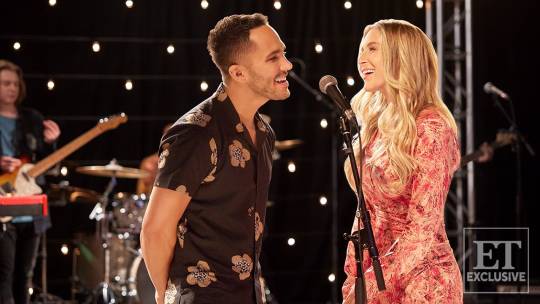
Alexa and Carlos PenaVega are teaming up for a new Hallmark romance with a musical spin.
The couple will star in the upcoming Love in the Limelight, an original movie kickstarting Hallmark Channel's "Fall Into Love" programming slate this August, ET can exclusively reveal. The film, which premieres Saturday, Aug. 6, features six new Spanglish songs written by Carlos PenaVega.
Inspired by the real-life love story of Willie Aames and Winnie Hung, Love in the Limelight follows Summer (Alexa PenaVega), a devoted fan of the popular boy band, the Mendez Boyz, especially lead singer Nick (Carlos PenaVega). After receiving a sweet fan letter from Summer, Nick decides to respond with a phone call, sparking the start of a friendship that’s lasted to this day. When Nick’s manager books a gig for him at a small venue in Summer’s hometown of Salt Lake City where she now works in human resources at a local university, the two finally meet face-to-face. It’s clear their friendship has set the stage for romance and Summer’s abuelita (Ivonne Coll), a hip grandma with a TikTok following, encourages her to follow her heart.
HALLMARK CHANNEL'S "FALL INTO LOVE"
All premieres are at 8 p.m. ET/PT.
Love in the Limelight
Starring: Alexa PenaVega, Carlos PenaVega and Ivonne Coll
Premieres: Saturday, Aug. 6
After years of being pen pals with Nick (Carlos PenaVega), Summer’s (Alexa PenaVega) teen crush and former lead singer of the popular boy band The Mendez Boyz, the two finally meet in person when he comes to town for a comeback concert. Their friendship has set the stage for romance and Summer’s abuelita (Coll) -- a hip grandma with a growing TikTok following -- encourages her to follow her heart.
Love by Design
Starring: Jaicy Elliot, Benjamin Hollingsworth and Candice Huffine
Premieres: Saturday, Aug. 13
Ella’s (Elliot) unique designs inspire publishing mogul Derek (Hollingsworth) to include plus-sized fashion in his magazine. It’s not long before Derek realizes that Ella’s influence reaches far beyond the catwalk.
Dating the Delaneys
Starring: Rachel Boston and Paul Campbell
Premieres: Saturday, Aug. 20
Maggie Delaney (Boston) is a divorced mother who ventures into the dating world with some help from Michael (Campbell) the single father of her son’s friend. At the same time, Maggie’s mother Barb (Karen Kruper) and her teen daughter Emma (Zoë Christie) begin romances of their own. As these three generations of women explore the highs and lows of modern dating, they learn that love and romance can be found at any age… and sometimes where you least expect it.
Game, Set, Love
Starring: Davida Williams, Richard Harmon and Tracy Austin
Premieres: Saturday, Aug. 27
Former pro tennis player Taylor (Williams) reluctantly agrees to coach her former doubles partner Ashley (Jennifer Khoe) and her new partner Will (Harmon), who needs to repair his reputation and career. Although Taylor and Will clash at first, she’s surprised to discover a different side to him. Even more surprising is when Taylor finds herself entering the tournament with Will after Ashley is sidelined by an injury. As they get ready to compete, the pair learns they just may be a perfect match.
HALLMARK MOVIES & MYSTERIES
All premieres are 9 p.m. ET/PT.
Big Sky River
Starring: Emmanuelle Vaugier and Kavan Smith
Premieres: Sunday, Aug. 7
Based on the book by Linda Lael Miller. Looking to take a break from New York City and place some real distance between herself and her ex-husband, Tara Kendall (Vaugier) books a summer rental in Parable, Montana. The small, rural town endeared itself to Tara as a young girl and she credits her time in Parable for her love of horses and horseback riding. Sheriff Boone Taylor (Smith) has finally found his footing after losing the love of his life. Boone is kind to his new neighbor, but he can’t deny that there’s something very special about Tara and he’d like her to stay for more than just one summer. When Tara’s stepdaughter reaches out for help, the painful realities of real-life step on any dreams of life in the country. That is, unless Tara can take care of those she loves and herself, all at once.
The Journey Ahead
Starring: Holly Robinson Peete and Kaylee Bryant
Premieres: Sunday, Aug. 14
A famous Hollywood actress (Robinson Peete) and a young wilderness expert (Bryant) drive together from Los Angeles to New York. Along the way, both women learn they can’t run from their past to create the future they want.
Groundswell
Starring: Lacey Chabert, Ektor RIvera and Katie Lee Biegel
Premieres: Sunday, Aug. 21
Based on the book by Katie Lee Biegel. On the heels of a personal and professional setback, Emma (Chabert), a chef from Atlanta, travels to Hawaii where she meets Ben (Rivera) a handsome, reclusive surf instructor whose lessons help her to regain her footing.
Unthinkably Good Things
Starring: Karen Pittman, Erica Ash, Joyful Drake, Jermaine Love and Lance Gross
Premieres: Sunday, Aug. 28
At a crossroads in her career and love life, Allison (Pittman) is in need of the love and support of her two friends Melina (Drake) and Reesa (Ash). When they visit her in Tuscany, the reunion causes each woman to reexamine the state of her own life and relationships. While they have different personalities and perspectives, they know each other’s truths and help to make life-changing decisions.
Click the link below for the full article at ETOnline
#news#hallmark movies#first look#photo preview#hallmark channel#fall into love#love in the limelight#alexa penavega#carlos penavega#love by design#jaicy elliot#benjamin hollingsworth#dating the delaneys#rachel boston#paul campbell#game set love#davida williams#richard harmon#tracy austin#hallmark movies & mysteries#big sky river#emmanuelle vaugier#kavan smith#the journey ahead#holly robinson peete#kaylee bryant#groundswell#lacy chabert#ektor rivera#unthinkably good things
8 notes
·
View notes
Photo
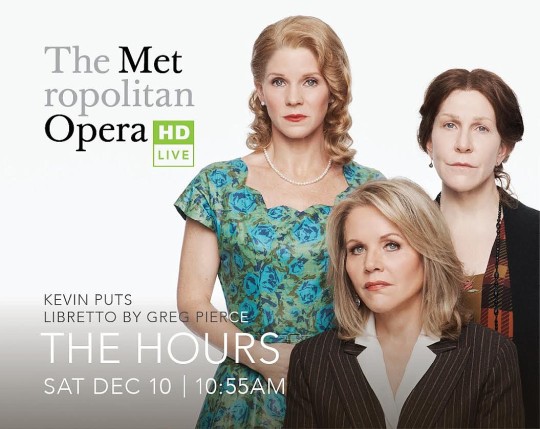
The Hours is a new opera with music by Kevin Puts and a libretto by Greg Pierce. Based on the novel of the same name by Michael Cunningham and its film adaptation, the production was chosen by star soprano Renée Fleming for her return to the Met stage. During the intermission interview, Puts and Pierce share that the piece was written almost entirely during lockdown, and shared their material and questions for each other via texts, calls, and emails. Fleming is joined onstage by mezzo-soprano Joyce DiDonato, and soprano Kelli O’Hara.
Act one starts strong with scenes featuring DiDonato as Virginia Woolf in 1923 working on her novel Mrs Dalloway; Fleming as Clarissa in the 1990s, preparing a dinner for her friend Richard, dying of AIDS; and the Metropolitan Opera chorus. Costumes by Tom Pye for the chorus have a startling dye job that, under the correct lighting, give the effect of the entire production being set underwater. However, the lighting changes from scene to scene, and the chorus never changes costume, leaving only a few further scenes in the remainder of the opera where the effect is again employed.
Puts’ score is most effective in its slower, lyrical sections, showcasing the Met Opera’s full orchestra. While not having heard any other work by Puts, the driving sections that propel the plot are typical of any other contemporary composer, i.e. Nico Muhly and John Adams, and not evocative of any personal style. Wind and string sections play highly rhythmic patterns that have slow harmonic changes, surely a nod to Philip Glass who scored the film version. The prelude to the first scene featuring Woolf is unfortunately scored for solo piano. It is both ineffective and jarring, barely able to accompany DiDonato’s rich voice by itself. The piano is brought back several times, and used for effect alongside the orchestra, to the detriment of the score as a whole.
It is in this scene when we are first introduced to Leonard Woolf played by the entirely miscast Sean Panikkar. Next to DiDonato, Panikkar looks like a hulking 7-foot-tall Adonis thirty years too young to play her husband. He had a pleasant tenor voice, but weak diction. Having to always share the stage with DiDonato also made it seem that his acting abilities were lacking, but I come up with a short list of other singers that could hold their own next to her.
Following this we are taken back to the 90s and treated to one of the two most striking scenes in the entire opera - the second is also in the 90s timeline, which is indicative. Clarissa is shopping for flowers and flirting with the owner, Barbara, played by Kathleen Kim. Kim has a fantastic coloratura voice and stage presence, put to great use by Puts who quotes several Mozart arias, a la Corgliano’s Ghosts of Versailles: the high Fs of the Queen of the Night enticing Clarissa to buy Ha-ha-ha-hydrangeas, and the final Pa-pa-pa-pa’s of Papagena for peonies. The entire chorus encircles them, bunches of flowers in both hands, the tableau bursting with colour and texture, reminding me of the framing of Mother Mary in the The Cell (2000) as well as the final shots of Midsommar (2019). My only complaint is that the bouquets could have been bigger and even more vibrant.
We are finally introduced to Kelli O’Hara’s Laura Brown in the 1950s, reading Mrs Dalloway in her bed, dreading to get up and greet her family on her husband’s birthday. This section came across as the weak link as the character had nonexistent motivations for her actions and a clichéd plot. How many stories in film and television have we already seen about a repressed housewife in the 1950s ready to buckle under the pressure of keeping the surface of her life glossy and clean? Brown feels no connection to her child and leaves him with a neighbour - also played by Kim - as she runs to a motel to kill herself with a bottle of pills. Her husband has done the irredeemable deed of buying her flowers and letting her sleep in on his birthday, and constantly showering their son with affection.
Kelly O’Hara’s acting was always visible, in the sense that it was constantly distracting to watch her and see her, for lack of a better term, go through the motions. Fleming and DiDonato in comparison seemed completely authentic. They were characters plucked from their lives and put on the stage, reacting to everything around them, and making choices and decisions moment to moment. There is something inexplicably off-putting about O’Hara’s performance, not even getting into the fact that the part is out of her grasp. The notes were there, of course, but the timbre of her voice was frequently strained, and not pleasant to listen to. Beside her co-stars there is a clearly audible gulf of technical proficiency between her and them.
Supporting the three leads is an ensemble of singers of mixed quality. Clarissa’s dying friend Richard is sung to perfection by bass-baritone Kyle Ketelsen. His rich voice could project at every dynamic, convey every emotion, and delivered every word with clear diction. His acting was also far better than most opera singers and met Fleming beat for beat, especially in the best scene of the entire opera where Clarissa visits Richard for one last time in his New York apartment. Clarissa’s partner Sally was played by Denyce Graves, whom I loved in Marnie, but sounded less than stellar in this live broadcast, every note uttered with a grating squawk.
In the 1950s Laura Brown’s husband delivered his lines serviceably, but not memorably. Her son was a a scene-stealer, and had a voice that projected loudly and clearly over the entire orchestra and chorus in the finale of Act 1. Back in the 20s, DiDonato is joined by another mezzo-soprano, Eve Gigliotti, playing the maid Nelly. From register to register Gigliotti’s voice was resonant and clear and I could only think of other parts I would love to hear her perform.
Finally, in another double-role, Sylvia D’Eramo plays Kitty in the 50s, and Woolf’s sister Vanessa in 1923. D’Eramo's voice seemed to belong to another singer, sounding more mature and full than her youthful looks would have you expect. She never took the focus away from O’Hara or DiDonato, but maybe should have been given the role of Brown instead. Next to O’Hara, D’Eramo was much more interesting to listen to and watch, and was able to play the young woman sharing a fleeting kiss with Brown, and mother to three as Vanessa.
There are two choices in this production that served no readily apparent purpose, and therefore failed in execution. First, a lone countertenor from the chorus singing wordlessly at the three leads throughout, the symbolism unclear if it had intention in the first place. Additionally, there is a dance cohort onstage for nearly the entirety of the production that serves no purpose other than to fill space, clutter the scenes with extra bodies, and brandish empty symbols of books, flowers, and kitchen appliances in the corresponding time periods. The oddest choice of all, to have one male dancer among the dozen or so women.
The set was disappointing and did not make use at all of the space and funds that the Met surely has at its disposal. Yet, in the second act there is one wow-element where a large silk screen comes billowing down from the ceiling and stretches right to the bottom of the stage to catch a set of black-and-white projections, a flashback with Clarissa and a young Richard on the beach, after which it is released and cascades to pool on the floor behind the singers. Again, it seems as the most care and attention is made for Fleming’s 1990s scenes.
Throughout the opera there is a reference to Richard’s book being great, but suffering from a ‘tacked-on’ ending. Ironically, this opera also suffers from the same fate. The finale is a chance for the leading women to shed their characters - none does so faster than O’Hara - adjusting their body language, and gazing directly into the audience, to address us in a trio containing only a handful of sentences, repeated ad nauseum with nearly no melodic variation, ‘Here is the world and you live in it. All alone. You try.’ I couldn’t tell if it was supposed to be sentimental, uplifting, melancholy, or what, but ultimately it comes across as smarmy. Richard Strauss this is not, despite Fleming and co. giving it their all.
#The Hours#metopera#renee fleming#joyce didonato#kelli o'hara#kevin puts#greg pierce#virginia woolf#mrs dalloway#phelim mcdermott
2 notes
·
View notes